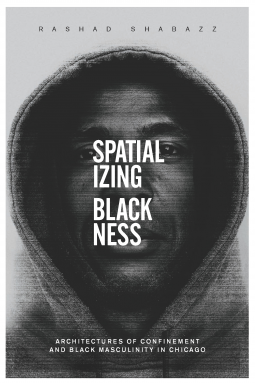
Spatializing Blackness
Architectures of Confinement and Black Masculinity in Chicago
by Rashad Shabazz
This title was previously available on NetGalley and is now archived.
Buy on Amazon
Buy on BN.com
Buy on Bookshop.org
*This page contains affiliate links, so we may earn a small commission when you make a purchase through links on our site at no additional cost to you.
Send NetGalley books directly to your Kindle or Kindle app
1
To read on a Kindle or Kindle app, please add kindle@netgalley.com as an approved email address to receive files in your Amazon account. Click here for step-by-step instructions.
2
Also find your Kindle email address within your Amazon account, and enter it here.
Pub Date Aug 20 2015 | Archive Date Jul 27 2016
Description
Over 277,000 African Americans migrated to Chicago between 1900 and 1940, an influx unsurpassed in any other northern city. From the start, carceral powers literally and figuratively created a prison-like environment to contain these African Americans within the so-called Black Belt on the city's South Side. A geographic study of race and gender, Spatializing Blackness casts light upon the ubiquitous--and ordinary--ways carceral power functions in places where African Americans live. Moving from the kitchenette to the prison cell, and mining forgotten facts from sources as diverse as maps and memoirs, Rashad Shabazz explores the myriad architectures of confinement, policing, surveillance, urban planning, and incarceration. In particular, he investigates how the ongoing carceral effort oriented and imbued black male bodies and gender performance from the Progressive Era to the present. The result is an essential interdisciplinary study that highlights the racialization of space, the role of containment in subordinating African Americans, the politics of mobility under conditions of alleged freedom, and the ways black men cope with--and resist--spacial containment. A timely response to the massive upswing in carceral forms within society, Spatializing Blackness examines how these mechanisms came to exist, why society aimed them against African Americans, and the consequences for black communities and black masculinity both historically and today.
Advance Praise
"An original work that teases out how the question of black masculinity has been linked to different processes of confinement and imprisonment with carceral power--both inside and outside the prison industrial complex--shaping and relegating black lives and inciting acts of preventable death."--Katherine McKittrick, author of Demonic Grounds: Black Women and the Cartographies of Struggle
"An engaging, interdisciplinary, historically situated examination of the creation of 'carceral' space in Chicago as a constituting dimension of the city's modern policing and de facto segregation of black people and communities. The work makes use of several vital intellectual traditions to make its case and thus pushes against dominant scholarly narratives of Chicago's racial-gender social formations."--Dylan Rodriguez, author of Forced Passages: Imprisoned Radical Intellectuals and the U.S. Prison Regime
"Highlights the crucial importance of the racialization of space, the role of containment in maintaining the subordination of black people, and the politics of mobility under conditions of 'freedom.'"--Tricia Rose, author of The Hip Hop Wars: What We Talk about When We Talk about Hip Hop--and Why It Matters
"In Spatializing Blackness Shabazz elucidates how the carceral operates in the everyday lives of Black Chicago. In doing so he forges a new historical geography of Blackness that provides a path for others to follow."--Laura Pulido, author of Black, Brown, Yellow, and Left: Radical Activism in Los Angeles
"An engaging, interdisciplinary, historically situated examination of the creation of 'carceral' space in Chicago as a constituting dimension of the city's modern policing and de facto segregation of black people and communities. The work makes use of several vital intellectual traditions to make its case and thus pushes against dominant scholarly narratives of Chicago's racial-gender social formations."--Dylan Rodriguez, author of Forced Passages: Imprisoned Radical Intellectuals and the U.S. Prison Regime
"Highlights the crucial importance of the racialization of space, the role of containment in maintaining the subordination of black people, and the politics of mobility under conditions of 'freedom.'"--Tricia Rose, author of The Hip Hop Wars: What We Talk about When We Talk about Hip Hop--and Why It Matters
"In Spatializing Blackness Shabazz elucidates how the carceral operates in the everyday lives of Black Chicago. In doing so he forges a new historical geography of Blackness that provides a path for others to follow."--Laura Pulido, author of Black, Brown, Yellow, and Left: Radical Activism in Los Angeles
Available Editions
| EDITION | Other Format |
| ISBN | 9780252081149 |
| PRICE | $25.00 (USD) |



